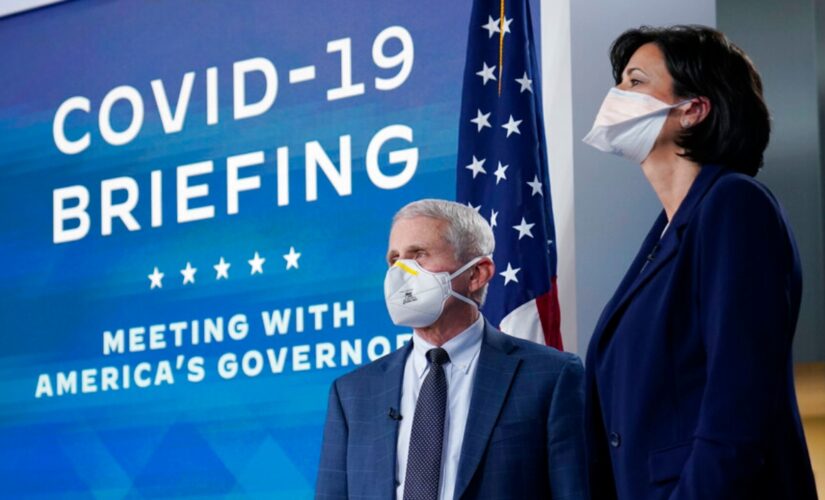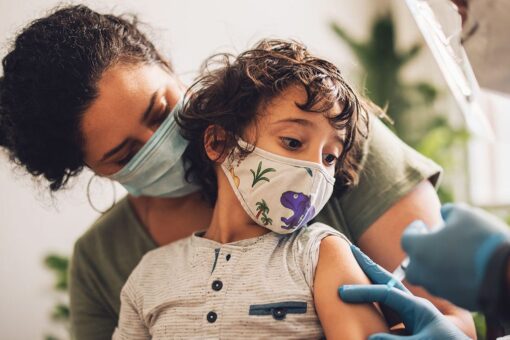Members of the White House COVID-19 response team reacted Wednesday to new guidance from the Food and Drug Administration (FDA) on the sensitivity of rapid antigen tests, telling reporters that the tests’ usefulness amid the pandemic has not altered.
White House chief medical adviser Dr. Anthony Fauci said it was already known that an antigen test was not as sensitive as a polymerase chain reaction (PCR) test.
CORONAVIRUS TESTING SITES PLAGUED WITH LONG WAITS AND LINES AS OMICRON SURGES: ‘OVERWHELMING’
“What the FDA was saying, that when they were looking at the sensitivity with regard to omicron, in some of the tests there appears to be somewhat of a diminution – not a disappearance, but a diminution – of the sensitivity,” he said.
“The fact that the sensitivity is diminished somewhat does not obviate the importance of the, still, advantage and usefulness of these tests under different circumstances. That was the message of the FDA. They wanted to make sure they were totally transparent in saying the sensitivity might come down a bit, but they did emphasize [that] there still is an important use of these tests.”
White House COVID-19 response coordinator Jeff Zients said the FDA release was sent out “to keep the public aware of their ongoing work to evaluate the FDA-authorized test level of sensitivity, specifically to omicron.”
“But, it’s clear that they are recommending their continued use,” he said. “As has been known for a while and was stated in the release, PCR tests are more sensitive than incident tests. I want to again emphasize that both are critical tools to stop the spread of COVID-19.”
A sign informs people that the library is out of COVID-19 home test kits, a day after Miami-Dade county libraries handed out free test kits at dozens of library branches, Tuesday, Dec. 28, 2021, in downtown Miami. (AP Photo/Rebecca Blackwell)
Centers for Disease Control and Prevention (CDC) Director Dr. Rochelle Walensky added that serial antigen testing is important in places like schools – echoing comments she made in an earlier interview on Wednesday – and that serial uses allows people to “easily give up a little bit in terms of sensitivity.”
“We do know that the antigen test may not perform as well as it had for prior variants – the alpha variant and the delta variant – but it’s still picking up quite a bit of infection,” she told NBC’s “Today” show.
Walensky also reiterated agency guidance stating that if an individual receives a negative result from an antigen test but experiences symptoms of COVID-19, they “should go ahead and get that PCR test.”
The FDA said that it had collaborated with the National Institutes of Health’s RADx program to study the performance of antigen tests with patient samples that have the omicron variant of the coronavirus.
“RADx recently performed preliminary studies evaluating the performance of some antigen tests using patient samples containing live virus, which represents the best way to evaluate true test performance in the short-term,” the FDA said. “Early data suggests that antigen tests do detect the omicron variant but may have reduced sensitivity.”
Prior to completing the live virus tests, RADx conducted initial laboratory tests using heat-inactivated samples for some of the currently available antigen tests, which were able to detect omicron and perform similarly when detecting other variants.
A member of the Salt Lake County Health Department COVID-19 testing staff performs a COVID-19 test outside the Salt Lake County Health Department, Tuesday, Dec. 28, 2021, in Salt Lake City. (AP Photo/Rick Bowmer)
Heat-inactivated samples are patient samples with omicron that have been heat-treated so that the virus is no longer live and the FDA says they are the best option when patient samples with a live virus are not available.
The FDA and RADx will continue to further evaluate the performance of antigen tests using samples with live virus, and noted in the statement that laboratory data are “not a replacement for clinical study evaluations using patient samples with live virus.”
CLICK HERE TO GET THE FOX NEWS APP
“The FDA continues to authorize the use of these tests as directed in the authorized labeling and individuals should continue to use them in accordance with the instructions included with the tests. Antigen tests are generally less sensitive and less likely to pick up very early infections compared to molecular tests,” the FDA wrote.
“In following the FDA’s long-standing rapid test recommendations, if a person tests negative with an antigen test but is suspected of having COVID-19, such as experiencing symptoms or have a high likelihood of infection due to exposure, follow-up molecular testing is important for determining a COVID-19 infection. If a person tests positive with an antigen test, they should self-isolate and seek follow-up care with a health care provider to determine the next steps.”
Julia Musto is a reporter for Fox News Digital. You can find her on Twitter at @JuliaElenaMusto.




